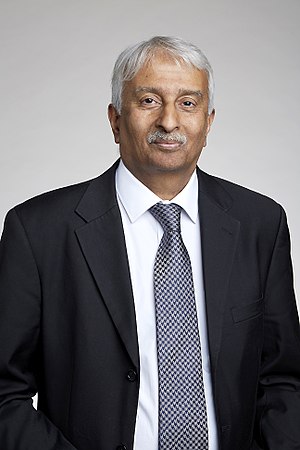Krishna Chatterjee
Krishna Chatterjee | |
|---|---|
 Krishna Chatterjee at the Royal Society admissions day in London, July 2017 | |
| Born | Vengalil Krishna Kumar Chatterjee 1958 (age 64–65)[1] |
| Alma mater | University of Oxford (BA, BM BCh)[1] |
| Scientific career | |
| Fields | Medicine Endocrinology |
| Institutions | University of Cambridge |
| Website | www |
(Vengalil) Krishna (Kumar) Chatterjee[1] FRS FMedSci FRCP[2] is a Professor of Endocrinology in the Department of Medicine at the University of Cambridge[3] and a Fellow of Churchill College, Cambridge.[4] He is also the director of the Cambridge Clinical Research Centre which is part of the National Institute for Health Research (NIHR).[5]
Education[edit]
Chatterjee was educated at Wolfson College, Oxford where he was awarded Bachelor of Arts and Bachelor of Medicine, Bachelor of Surgery degrees in 1982.[1][6]
Research and career[edit]
Chatterjee is distinguished for his discoveries of genetic disorders of thyroid gland formation, regulation of hormone synthesis and hormone action, which have advanced fundamental knowledge of the hypothalamic–pituitary–thyroid axis.[2] He has identified dominant negative inhibition by defective nuclear receptors as a common mechanism in thyroid hormone resistance and peroxisome proliferator-activated receptor gamma (PPARγ)-mediated insulin resistance.[2][7] He has shown how deficiency of human selenocysteine-containing proteins causes a multisystem disease, including disordered thyroid hormone metabolism. He seeks to translate such understanding into better diagnosis and therapy of both rare and common thyroid conditions.[2]
Notable Cambridge scientists with whom Chatterjee has shared paper authorship include Sadaf Farooqi, Stephen O'Rahilly, Antonio Vidal-Puig, and Nick Wareham.
This section needs expansion. You can help by adding to it. (August 2017) |
References[edit]
- ^ a b c d Anon (2017). "CHATTERJEE, Prof. (Vengalil) Krishna (Kumar)". Who's Who. ukwhoswho.com (online Oxford University Press ed.). A & C Black, an imprint of Bloomsbury Publishing plc. doi:10.1093/ww/9780199540884.013.10709. (Subscription or UK public library membership required.) (subscription required)
- ^ a b c d Anon (2017). "Professor Krishna Chatterjee FMedSci FRS". royalsociety.org. London: Royal Society. One or more of the preceding sentences incorporates text from the royalsociety.org website where:
“All text published under the heading 'Biography' on Fellow profile pages is available under Creative Commons Attribution 4.0 International License.” --"Royal Society Terms, conditions and policies". Archived from the original on 2016-11-11. Retrieved 2016-03-09.
{{cite web}}: CS1 maint: bot: original URL status unknown (link) - ^ Krishna Chatterjee publications indexed by the Scopus bibliographic database. (subscription required)
- ^ "Professor Krishna Chatterjee". chu.cam.ac.uk. Archived from the original on 2017-08-11.
- ^ "Krishna Chatterjee". Wellcome-MRC Institute of Metabolic Science. Retrieved 2022-02-09.
- ^ "ORCID". orcid.org. Retrieved 2022-02-09.
- ^ O'Rahilly, S.; Barroso, I.; Gurnell, M.; Crowley, V. E. F.; Agostini, M.; Schwabe, J. W.; Soos, M. A.; Maslen, G. LI; Williams, T. D. M.; Lewis, H.; Schafer, A. J.; Chatterjee, V. K. K. (1999). "Dominant negative mutations in human PPARbig gamma associated with severe insulin resistance, diabetes mellitus and hypertension". Nature. 402 (6764): 880–883. doi:10.1038/47254. ISSN 0028-0836. PMID 10622252. (subscription required)
- Pages containing links to subscription-only content
- CS1 maint: bot: original URL status unknown
- Articles with short description
- Short description with empty Wikidata description
- Articles without Wikidata item
- Articles with hCards
- Articles to be expanded from August 2017
- All articles to be expanded
- Articles using small message boxes
- AC with 0 elements
- Fellows of the Royal Society
- Fellows of the Academy of Medical Sciences (United Kingdom)
- Fellows of Churchill College, Cambridge
- NIHR Senior Investigators
- Alumni of the University of Oxford
- Living people
- 1958 births
- All stub articles
- Scientist stubs